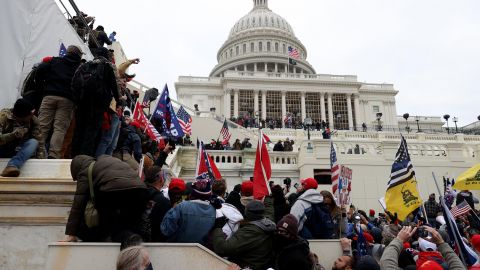Ashraf Ahmed: Moore v. Harper basically emerges out of a dispute over the constitutionality of a 2021 congressional map that was drawn by a Republican majority legislature in North Carolina. The Republican legislature starts with a gerrymandered partisan gerrymandered map. And the North Carolina Supreme Court finds for the plaintiffs, strikes down the map as unconstitutional gerrymander, partisan gerrymander under the state Constitution. So at that point, the Republican legislature appeals to the US Supreme Court with one of their claims being that the elections clause of the US Constitution exclusively reserves authority over state election administration to state legislatures.
Ashraf Ahmed: It’s kind of terrifying if you’re just an average citizen. This decision is really important because it rejects the independent state legislative theory. That theory, which I’ll explain shortly, is both radical and new, and it’s premised on a really narrow reading of the elections clause of the US Constitution and also the presidential electors clause.
Ashraf Ahmed: The elections clause reads as follows: “The time, place and manner of holding elections for senators and representatives shall be prescribed in each state. And here’s the key word by the legislature there. But Congress may at any time by law, make or alter such regulations, except that in the place of choosing senators. Now, basically, since the start of the republic, legislatures have shared authority over election administration with state courts and governors. And so if you need to pass laws governing elections at the state level, there’s a role for all three branches of state government. The government, the governor, who’s basically the president of the state. Right. Often has veto power. And state courts exercise judicial review to make sure that laws, including laws governing elections, square with state constitutions. So what are independent, what is independent state legislature theory doing? Well, it’s basically claiming that when it comes to election administration, only the legislature and not the governor, not the courts have have authority that it’s like a special carve out. Why? Because the elections clause only explicitly mentions the word “legislature.”
Ashraf Ahmed: So let me list the parade of horribles that could have happened here, going from indirect to direct. Because election subversion is like the doomsday scenario. So, for instance, let’s say the court embraces independent state legislature theory. That would have had the potential to completely upend the democratic process as we understand it. So, for instance, state Supreme Court decisions in various states that have restricted partisan gerrymandering under their constitutions would have been essentially nullified. Similarly, independent redistricting commissions would be under threat. Other independent and ideally nonpartisan election authorities, and again, I stress ideally, like state election commissions and secretaries of state, who have the authority to make emergency election decisions, right? They could be stripped of that authority and that power could be reassigned to legislatures leaving federal courts as the only venue for recourse for plaintiffs. And while all of these are indirect election subversion, and corrosive of the democratic process more generally, the worst-case scenario under independent state legislative theory is the following. So for an independent state legislative theory, the other clause of the Constitution that’s important for them is the presidential election electors clause. That clause again reads: “Each state shall appoint in manner in such manner as the legislature thereof may direct and number of electors.” Again, you see the word legislature there. Right? So the structure of the argument is very similar. Here, they’d say, an independent state legislative theorist would say, because only the legislature is mentioned, a Republican state legislature could have decided that it was dissatisfied with how state administrators and the courts had conducted an election: ‘Oh, but they did not follow state election law faithfully. We’re worried about the integrity of the process that they put in place’. And then, this legislature, the state assembly, they could refuse to certify the results of a presidential election. They could say, hey, look, we don’t trust these results that have come out and instead select its own electors. Right? Basically assigning the electors of the state elsewhere. I.e., choose the candidate of their own liking instead. So if it’s a Republican majority state legislature in 2020, this would have been Donald Trump. Right? Instead of what the majority of the state voters had done. Something very much like this, this plan less polished and less legalistic without the varnish of fancy law professors and like elite white shoe litigators. Something like this was at the core of President Trump’s unsuccessful attempts to overturn the results of the 2020 election.
Ashraf Ahmed: Basically, the majority decides, we’re not accepting this theory. We have done elections in a particular way for centuries. And in particular states and state supreme courts have been exercising judicial review even before the Republic was even founded. And so we’re not going to make some carve out from state judicial review for just the elections clause. Moreover, we have precedent that shows that we have recognized the role of the executive, popular referenda and other non-legislative actors other than the legislature and the election administration process.
Ashraf Ahmed: The Supreme Court has, at the end of the decision in Moore v. Harper basically says, by the way, we still retain our authority to review state Supreme Court decisions if their interpretation of state statutes, right? State election law statutes is, are unreasonable. All we’re saying here is that we retain the authority when we see fit to intervene. Could that be used in a fashion that we think is subverting an election? Sure. You could have something like Bush v Gore, like the fact pattern of Bush v Gore emerge. In the grand scheme of things? Basically, have we preserved the status quo since Bush v Gore here? Yes. We haven’t gone into like a much more extreme place. So like the the specter of a Supreme Court intervening remains.
Ashraf Ahmed: Moore v. Harper is not really helping out North Carolina voters. What you’re going to have is the Republican legislature is going to draw its own map, a new map that’s almost certainly going to be gerrymandered very heavily and their state Supreme Court is going to uphold it. That said, some state officials in North Carolina have stated Allen v. Milligan, the case that kept Section 2 vote dilution claims, racial discrimination claims in place. That could be a tool to bring cases under the Voting Rights Act against any potential new map. So we’re not this story isn’t over yet.
Ashraf Ahmed: I mean, this is about as good an outcome in these two cases as one could expect. Is a cause for dancing in the streets? No, I don’t think that’s the case. But, you know, it also suggests that they basically, a coup, or a coup-like election subversion attempt through the courts is not going to be as viable a strategy as in 2024.


